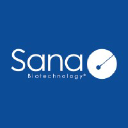Companies
Discover all trending biotech companies
Discover all trending biotech companies

Company Research Platform
Global Employees
354
R&D Investment
37000000
Sana Biotechnology's oncology segment focuses on developing both in vivo and ex vivo cell therapies to target various cancers. This includes the development of allogeneic CAR-T cell therapies, such as SC291 targeting CD19+ cancers and SC255 for multiple myeloma. The company's research involves engineering cells to enhance their ability to recognize and destroy cancer cells while minimizing off-target effects. Key technologies include hypoimmune cell engineering to prevent rejection and improve persistence. Clinical trials are underway to evaluate the safety and efficacy of these therapies in patients with lymphoma, leukemia, and multiple myeloma. The goal is to provide more effective and accessible treatments for cancer patients with unmet needs, potentially leading to improved survival rates and quality of life. Future opportunities include expanding the pipeline to address additional cancer types and developing combination therapies to overcome resistance mechanisms.
This segment is dedicated to developing engineered cell therapies for the treatment of genetic disorders, such as sickle cell disease, beta-thalassemia, and ornithine transcarbamylase deficiency (OTC). Sana Biotechnology is employing in vivo and ex vivo cell engineering platforms to correct or compensate for genetic defects. For example, SG418 is being developed for sickle cell disease and beta-thalassemia, while SG328 targets OTC deficiency. Research efforts focus on gene editing technologies, such as CRISPR, to modify the patient's own cells or donor cells to restore normal gene function. The company is also working on improving cell delivery methods to ensure efficient targeting of affected tissues. Clinical trials are designed to assess the safety and efficacy of these therapies in improving patient outcomes and reducing the need for chronic treatments. The long-term vision is to provide curative therapies for genetic disorders, offering patients a chance at a healthier and more fulfilling life. Regulatory pathways and clinical validation are critical aspects of this segment.
Sana Biotechnology's hypoimmune platform is a core technology that underpins many of its therapeutic programs. This segment focuses on engineering cells to evade the immune system, allowing for allogeneic cell therapies that can be administered without the need for immunosuppression. The research involves modifying cells to reduce the expression of MHC class I and II molecules and to express immune-modulatory proteins. This technology is being applied to various cell types, including T cells, stem cells, and islet cells, to create 'universal' cells that can be used in a broad range of patients. The hypoimmune platform is critical for the success of Sana's allogeneic cell therapy programs, as it aims to overcome the limitations of autologous therapies, such as high cost and manufacturing complexity. The company is also exploring the use of this technology in regenerative medicine applications, such as islet cell transplantation for type 1 diabetes. Clinical trials are designed to evaluate the safety and efficacy of hypoimmune cells in preventing rejection and improving long-term engraftment.
Sana Biotechnology is actively developing cell therapies for type 1 diabetes, with a focus on islet cell transplantation. Their lead candidate, SC451, aims to restore insulin production in patients with T1D by transplanting engineered islet cells. A key innovation is the use of hypoimmune technology to protect the transplanted cells from immune rejection, eliminating the need for chronic immunosuppression. The company has reported positive clinical results from a study of islet cell transplantation without immunosuppression, demonstrating the potential of this approach. Research efforts are focused on optimizing cell engraftment, improving insulin secretion, and ensuring long-term cell survival. Clinical trials are designed to assess the safety and efficacy of SC451 in improving glycemic control and reducing the need for insulin injections. The goal is to provide a functional cure for type 1 diabetes, offering patients a chance to live without the burden of daily insulin management. This segment represents a significant opportunity to address a major unmet medical need and improve the lives of millions of people with T1D.